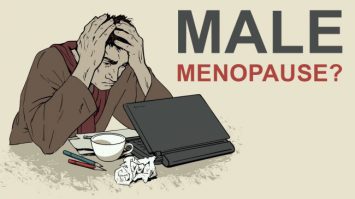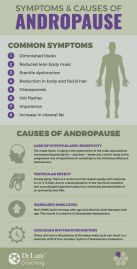Health Talk Blog
JUNE BLOG
MEN’S HEALTH MONTH - MALE MENOPAUSE
What Is Male "Menopause?"
Women may not be the only ones who suffer the effects of changing hormones. Doctors are noticing men are reporting some of the same symptoms that women experience in perimenopause and menopause.
It is still being debated if men really do go through a well-defined menopause as testosterone levels decline. Doctors acknowledge that men receiving hormone therapy with testosterone have reported relief of some symptoms associated with so-called male menopause.
Because men do not go through a well-defined period referred to as menopause, some doctors refer to this issue as androgen, testosterone decline in the aging male -- or late-onset male hypogonadism or low testosterone. It is normal for men to experience a decline in the production of testosterone with aging, but this also occurs with other medical conditions such as diabetes. Along with the decline in testosterone, some men experience:
- Fatigue
- Weakness
- Depression
- Sexual problems
Menopause in women is recognized when hormone production stops completely and they no longer are able to have children. In men, testosterone decline is a slower process. The testes, unlike the ovaries, do not run out of the substance it needs to make testosterone. A healthy man may be able to produce sperm and still father children well into their 80s or later! With disease, subtle changes in the function of the testes may occur as early as 45 to 50 years of age and more dramatically after the age of 70.
Subtle Symptoms of Low Testosterone
For millions of men who have low testosterone levels but no symptoms, no treatment is currently recommended. It is has also not been approved to treat men with low levels because of aging. Symptoms of low testosterone can be subtle or at times subtly obvious! Certain conditions can also lead to an abnormally low testosterone levels such as:
- Low sex drive or libido
- Erectile dysfunction
- Fatigue and poor energy level
- Decreased muscle mass
- Body and facial hair loss
- Difficulty concentrating
- Depression
- Irritability
- Low sense of well-being
- Changes in sleep patterns - sleep disturbances, such as insomnia or increased sleepiness.
- Physical changes - increased body fat, reduced muscle bulk and strength, and decreased bone density, swollen or tender breasts (gynecomastia) and loss of body hair are possible. Rarely, you may experience hot flashes.
- Emotional changes - a decrease in motivation or self-confidence, feel sad or have trouble concentrating or remembering things.
A study published in the New England Journal of Medicine conducted in healthy men in Manchester, England, examining 3,369 men from 40 to 79 years of age throughout Europe found only 2 percent of men developed male menopause.
0.1% had low testosterone between 40 and 49 years, increasing to 0.6% at 50-59 years, 3.2% between 60 and 69 years and 5.1 % between 70 and 79 years.
The Institute of Medicine reported in 2003 that hypogonadism was under diagnosed and as many as 2.9 million men ages 49-60 years had low testosterone levels and approximately 13 million American men had hypogonadism.
Low testosterone is also associated with a number of serious medical problems, including loss of muscle with weakness and frailty, bone loss leading to osteoporosis and perhaps significant declines in memory. It's reasonable to recommend measuring testosterone levels in men with sexual dysfunction, in those with severe fatigue, frailty and when diagnosed with osteoporosis.
When deficiency does exist, testosterone replacement can be highly effective in improving quality of life. If values are normal, testosterone therapy won't improve sexual function or any other symptom. Research has shown when testosterone levels are clearly deficient, replacement can lead to increased energy, improvements in memory and in combination with exercise and physical therapy, improved gait, balance and strength.
Before replacing testosterone, it's important to screen for prostate cancer. The hormone may stimulate tumor growth and most experts recommend that it not be given to men with the disease or those with increased PSA levels, the screening test for prostate cancer.
How Is Male "Menopause" Diagnosed?
For a diagnosis of male "menopause, "doctors will perform a physical exam, review symptoms,
order tests to rule out medical problems that may be contribute to the condition, order blood tests and measure testosterone levels.
Can Male "Menopause" Be Treated?
If testosterone levels are low, testosterone replacement therapy may help relieve symptoms of decreased libido, depression and fatigue. Just as with hormone replacement therapy in women, testosterone replacement therapy has potential risks and side effects. Replacing testosterone may worsen prostate cancer and increase the risk of heart disease.
If you are considering androgen replacement therapy, first talk to a doctor for more information to evaluate if the therapy is right for you. Your doctor may also recommend certain lifestyle or other changes such as diet, exercise and medications, to help with some symptoms of male menopause.
Relief with herbs and nutrients.
Some are wary of herbal supplements as they haven't been proven safe and effective for aging-related low testosterone. But on the other hand, men have gotten relief by adding herbs and nutrients in their health regimine.
Nutrients for erectile dysfunction vary. Essential nutrients can include:
- Essential fatty acid complex – Aids in the formation of sperm and seminal fluid in the prostate
- Selenium – is found in high concentrations in the testicles. Do not take if you have heart, liver or kidney disease.
- Vitamin E – Increases circulation, but is also a blood thinner
- Zinc – Helps boost testosterone levels and important in the prostate function and reproductive organ growth
- Dimethylglycine or DMG – Increases oxygen supply in the blood to all tissue. Blood vessels must be dilated for an erection to occur.
- GH-3 – Stimulates the of sex hormones
- Raw orchic glandular – Extracts from the male reproductive organs that promote their function.
Herbs include:
- Damiana – is good for improving blood flow to the genital area and increasing desire
- Sarsaparila – contains a testosterone like substance for men.
- Yohimbe Bark – comes from West Africa and is said to expand the blood vessels in the penis and increase blood flow as well as increasing nitrous oxide, NO, which is important for an erection
- Do not use if you have hypertension, high blood pressure, heart disease, stomach ulcers, depression or psychiatric disorders.
- Hydrangea root – good for prostate disorders
- Pygeum – Lowers levels of inflammatory compounds in the prostate. Effective in reducing prostate enlargement and symptoms associated with benign prostatic hyperplasia or urinary hesitancy, weak urine flow and recurring urinary infections.
- Saw palmetto – Inhibits the production of dihydrotestosterone, which contributes to the enlargement of the prostate.
Is Testosterone Replacement Therapy Right for You?
Many men with low testosterone notice positive improvement after testosterone treatment. If testosterone is low, why not replace it? Not so fast. A low testosterone level by itself doesn't need treatment. Testosterone replacement therapy can have side effects, and the long-term risks and benefits aren't known. Only men with symptoms of low testosterone and blood levels that confirm this as the cause of symptoms should consider testosterone replacement. Testosterone replacement therapy is available in several forms. All can improve testosterone levels.
Talking with your doctor is the only way to know if testosterone therapy is right for you.
Which Forms of Testosterone Supplements is right for you?
- Skin patch or transdermal - Androderm is a skin patch worn on the arm or upper body. It's applied once a day.
- Gels
- AndroGel and Testim come in packets of clear testosterone gel. Testosterone is absorbed directly through the skin when the gel is applied daily.
- AndroGel, Axiron, and Fortesta also come in a pump that delivers the amount of testosterone prescribed by your doctor.
- Natesto is a gel applied inside the nasal cavity.
- Mouth patch - Striant is a tablet that sticks to the upper gums above the incisor, the tooth just to the right or left of the two front teeth. Applied twice a day, it continuously releases testosterone into the blood through the oral tissues.
- Injections and implants - Testosterone can also be injected directly into the muscles, or implanted as pellets in the soft tissues. Your body slowly absorbs the testosterone into the bloodstream.
Why not a simple testosterone pill? Oral testosterone is available however some experts believe oral testosterone can have negative effects on the liver. Using other methods, such as skin patches, gels, orally disintegrating tablets, or injections, bypasses the liver and gets testosterone into the blood directly.
Benefits of Testosterone Therapy
It's impossible to predict what you can expect from testosterone treatment, because every man is different. Testosterone also increases bone density, muscle mass and insulin sensitivity in some men. Whether these effects are barely noticeable, or a major boost, is highly individualized.
Karen Herbst, MD, PhD, an endocrinologist at the University of California-San Diego, specializes in testosterone deficiency. She estimates that one in 10 men are "ecstatic" about their response to testosterone therapy, while about the same number "don't notice much."
Risks of Testosterone Therapy
Testosterone replacement therapy side effects include rash, itching, or irritation at the site where testosterone is applied. However, there is also evidence of the increased risk of heart attack or stroke associated with testosterone use. Experts emphasize that the benefits and risks of long-term testosterone therapy are unknown, because large clinical trials haven't been done.
There are a few health conditions that experts believe testosterone therapy can worsen:
- Benign prostatic hypertrophy (BPH) - The prostate grows naturally under the stimulation of testosterone. For many men, their prostates grow larger as they age, squeezing the tube carrying urine, the urethra. The result is difficulty urinating. This condition, benign prostatic hypertrophy, can be made worse by testosterone therapy.
- Prostate cancer - Testosterone can stimulate the growth of prostate cancer. Most experts recommend screening for prostate cancer before starting testosterone replacement. Men with prostate cancer or elevated prostate specific antigen, PSA, should probably avoid testosterone treatment.
- Sleep apnea: This condition can be worsened by testosterone replacement. It may be difficult for a man to detect this issue themselves, but your sleeping partner can often tell. A sleep study, polysomnography, may be needed to make the diagnosis.
- Blood clots - The FDA requires that testosterone replacement products carry a warning about the risk of blood clots in veins. This could increase the risk of deep vein thrombosis and pulmonary embolism, a potentially life threatening clot that occurs in the lungs. Products already carried a warning about the risk of blood clots due to polycythemia, an abnormal rise in the number of red blood cells that sometimes occurs with testosterone treatment. Now the warning is more general to include men who don't have polycythemia.
- Congestive heart failure or CHF - Men with severe congestive heart failure should usually not take testosterone replacement, as it can worsen the condition.
Testosterone Replacement vs. Performance-Enhancing Steroids
Isn't taking testosterone replacement basically the same as taking steroids, or “doping” in athletes? It's true that anabolic steroids used by some bodybuilders and athletes contain testosterone or chemicals that act like testosterone.
The difference is that doses used in testosterone replacement only achieve physiologic or “natural” levels of hormone in the blood. The testosterone forms some athletes use illegally are in much higher doses, and often combined or "stacked" with other substances that boost the overall muscle-building anabolic effect.
ALWAYS CONSULT YOUR PERSONAL HEALTH CARE PROFESSIONAL
- Prescription for Nutritional Healing, Phyllis A. Balch, CNC, Fifth Edition
- Dr. David Lipschitz, Medical Director, The Mruk Family Education Center on Aging and the Fairlamb Senior Health Clinic. askdrdavid@gmail.com.
- https://www.webmd.com/men/guide/male-menopause#1-4
- https://www.mayoclinic.org/healthy-lifestyle/mens-health/in-depth/male-menopause/art-20048056
- https://academic.oup.com/jcem/article/99/10/49A/2836147
- https://www.webmd.com/men/guide/testosterone-replacement-therapy-is-it-right-for-you#1-3
- https://www.issm.info/sexual-health-qa/do-men-go-through-male-menopause/
- https://www.baxterbulletin.com/story/news/local/2017/10/03/there-such-thing-male-menopause/726908001/





